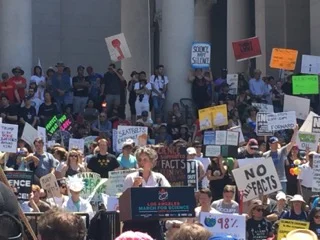California’s Elephant in the Room
California’s Elephant in the Room: We are a Tax Restricted State
Stephanie Pincetl, Professor in Residence, Institute of the Environment and Sustainability, UCLA
With all of the talk of California’s economic success and environmental leadership – it is the sixth largest economy in the world; it ranks forty-third among all the states in terms of receiving federal funding per capita; its employment rate is about five percent; it has pioneered cap and trade and has high targets for reducing greenhouse gas emissions -- the well-known secret is that it is tax restricted requiring two-thirds majority vote for new taxes, fees and bonds. The initiatives of Jarvis-Gann Era in the 1970s slashed the state’s property taxes under Proposition 13 in 1978 ushering in severe cuts to local governments, notably schools, and distorting land use zoning to favor high sales tax revenue developments, and heightened sprawl. Proposition 26 (2010) requires a two-thirds supermajority vote in the California State Legislature to pass many fees, levies, charges and tax revenue allocations that under the state's previous rules could be enacted by a simple majority vote. In addition, the state’s constitution requires two-thirds majority vote of each chamber of the state legislature to pass taxes, similar to only three other states in the nation.
California ranks forty-first (2017) in per capita school spending, (up from forty-sixth earlier in the decade), and fifty-first in terms of students per teacher. College and university fees keep being ratcheted up. Proposition 218, aimed at constraining increases for fees for services, such as sanitation fees, water rates, and other funds for maintaining infrastructure and charging for scarcity, requires that local governments use assessments and property-related fees only to finance projects and services that directly benefit property--and that that they be approved in an election. This means that programs that benefit people, rather than property --such as libraries, mosquito abatement, recreation programs, police protection, and some business improvement programs--must be financed by general or special taxes or by other non-assessment revenues that require two-thirds vote. For the Los Angeles region, this means for example, with current levels of funding, infrastructure that is a century old, can only be replaced on an 80-year cycle, let alone updated. A two-thirds majority vote would be required for new stormwater clean-up, flood control and water infiltration projects. With new technologies, new materials and new needs such as water conservation and recycling, or complete streets and bike paths, this means little to no new funding is available without bonds. Bonds need two-thirds majority vote and take funds out of the general fund for interest repayment, further reducing available resources.
With the challenges before the state, and its commitment to environmental protection, greenhouse gas reduction, climate impact mitigation, health care for all, housing for the low income and homeless, improved public transportation and more, and the prospect of greatly declining federal assistance, what is to be done? The new administration in Washington seems likely to pass health care reform that will leave tens of millions uninsured, or marginally insured. If, as Supervisor Kuehl is spearheading, California develops a single payer system, as it should, how will it be paid for? If we need to invest in water infrastructure and repair, for example, dredging silt, sand and gravel from reservoirs, or investing in water recycling and reuse, where will the funding come from? How will the state or region pay for these necessary investments? How will Los Angeles balance its budget without additional revenues, and what about cities whose pension plans have spiraled far beyond the budget constraints of the locality. Further, with federal cuts to science funding, should the state not invest in maintaining our world leading scientific research infrastructure?
It is time to be brave. Not only must we question the democratic legitimacy of a two-thirds majority vote for any new funding, but we must also take a close look at the state’s own taxation system. As Governor Brown has pointed out, it is highly dependent on high income taxes for the wealthy which is a precarious dependence as previous economic downturns have shown. Since Proposition 13, cities, counties, schools and special districts have groped for ways to pay for services, creating a patchwork of add-on fees, property tax surcharges and varying sales tax rates. Significant modernization of this system is needed. To begin with, a Constitutional Amendment that changes the two-thirds majority vote for raising taxes to a simple majority or fifty-five percent majority (fifty-five percent, is, after all, still a super majority). Further, taxing services makes sense in a service economy. Property taxes that are lower in California than the national average need to increase and become more equitable among residential and commercial properties. Reassessing commercial property rates at higher rates than residential should be implemented. These ideas are not original, but they have also gone nowhere. With the impending changes in Washington DC, it is urgent to revise the state’s tax structure to maintain the state’s leadership and livability, and economic performance.




